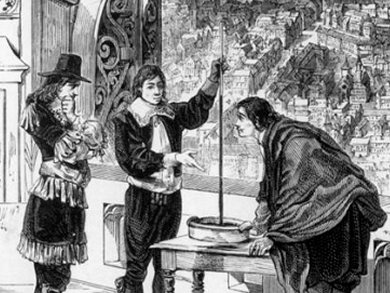Blaise Pascal was born in 1623 in Clermont-Ferrand, France. In 1631, he and his family moved to Paris, France. He was educated at home by his father, Étienne Pascal, who was a tax collector and lawyer and had an interest in science and mathematics.
In 1639, Pascal published his first work, an essay on the geometric theorem that is now named after him and that describes conic sections as they relate to hexagons. The same year, Pascal’s father was appointed as the commissioner of taxes in Rouen, France, and in 1642 Pascal began work on a mechanical calculator to assist his father’s tax calculations. Pascal’s calculator, or Pascaline, was capable of addition and subtraction, although it never became anything more than a novelty.
From 1639–1654, Pascal made contributions to probability theory, the understanding of the equilibrium of fluids, and performed a range of experiments that disputed the widely-accepted idea that a vacuum can not exist in nature.
In 1654, Pascal had a religious conversion and began publishing literary works on religion. From then on, religious matters occupied more and more of his time, displacing his investigations into the physical workings of the world. His two main theological publications are Les lettres provinciales (The Provincial Letters), which is still considered a masterpiece of French literature, and Pensées (Thoughts), published posthumously.
In the last three years of his life, Pascal suffered from poor health, finally succumbing on 18 August, 1662, at the age of 39.
Pascal’s theory of probability is arguably his most influential contribution to mathematics, with applications today in economics and actuarial science. His contributions to chemistry and the physicals sciences are remembered in the SI unit of pressure and tensile strength which bears his name (1 Pa = 1 Nm–2 = 1 kgm–1s–2) .
Blaise Pascal is the answer to Guess the Chemist (8), which gives details about his scientific achievements.
Also of interest:
- Blaise Pascal’s New Experiments On Vacua,
Willard J. Fisher,
School Sci. Math. 1919, 19(1), 11–19.
DOI: 10.1111/j.1949-8594.1919.tb12338.x - Pascal’s legacy,
John F. Ross,
EMBO Reports 2004, 5, S7–S10.
DOI: 10.1038/sj.embor.7400229




